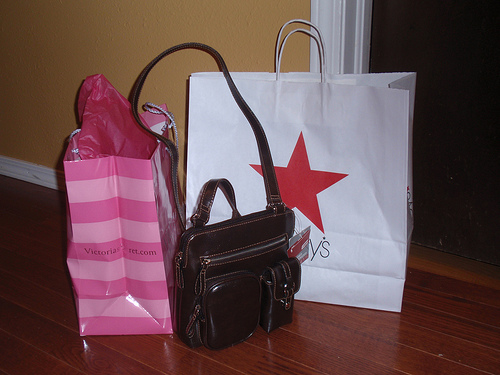I decided to take a trip to our nearest factory outlet stores last weekend to pick up a few warmer weather items for my upcoming vacation (Goodbye, Pittsburgh. Hello, Los Angeles!). They’re typically known for having cheaper prices than you’d normally find in the stores at the mall, so this is usually the first place I think of going when my wardrobe needs a major overhaul every few years.
I tend to get a little slap-happy when I find myself surrounded by discounts, thinking about all of the money I’m saving. But am I really? I had a friend that used to tease me every time I came home excited about something I got “on sale”: a new bag, patio furniture, whatever. He would always ask if it was something I really needed, or if it was something that I wouldn’t have purchased otherwise. Only recently have I started to give this more thought. Am I really saving money or am I just spending less?
Let’s think in terms of technical definitions: to save is to keep and store for later use, to spend is to pay out. “Saving” is interpreted as something positive, and that’s how stores can pull you in. You’re more likely to feel better about making a purchase when you think you’re getting a deal. No matter how much you think you’re saving though, you’re still spending money and not saving it.
You should also ask yourself, “Is this a planned purchase or is this unnecessary?” This was always my rationale for claiming my “savings.” If I was planning to buy something – let’s say a grill, for example – I would scout out a few that interest me and I might set aside a few hundred dollars to make the purchase based on their listed prices. However, if that grill happens to go on sale, I’d buy it then before it went back up to full price. To me, I’ve saved money because I was already willing to pay the full price, but I got it for less than what I had planned for. Instead of shelling out $300, I might pay $250 and put that extra $50 I had set aside back into my savings account. It’s different from making an impulse purchase. I almost always get pulled over to the dark side in the Coach store, so I’ll use that as my counter example. Almost everything is marked as “on sale” and they often tag on an extra 50% off. Sometimes it’s hard to resist that number because it feels like you’re getting a great deal, but in reality, you don’t really need to make the purchase to begin with. In this case, you might be “saving” 75% on an item, but in reality, you’re still spending money that you wouldn’t have ordinarily, so you haven’t saved anything.
I’ve gone back and forth, but I think this is the bottom line: if you really want to save money, you’re going to have to do it by cutting out or limiting your unnecessary spending. Instead, adjust your budget to include more frivolous expenses (like trips to the mall) or devote more of your income to your monthly savings account. While shopping for a bargain might save money in certain situations, it won’t help you to grow your savings the way you might by budgeting your expenses.
What do you think? Are you saving more or spending less by sale-shopping? Let us know where you stand!

